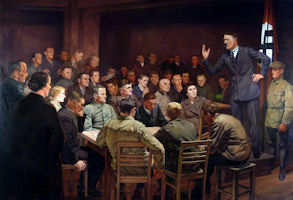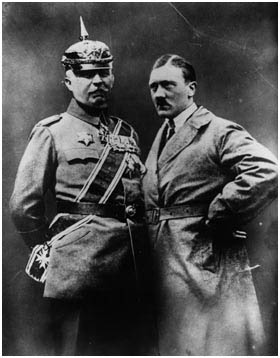Adolf Hitler - Weimar Years (1919-1932)
 Hitler became an agent for German military after war's end, checking on the many political parties which might threaten stability of Weimer Rupublic, Germany's democratic government after the war. As such, he attended meetings of the German Workers Party in September, 1919. Hitler impressed members of the party with his fervor during an impassioned speech he suddenly made, and was invited to join.
Hitler became an agent for German military after war's end, checking on the many political parties which might threaten stability of Weimer Rupublic, Germany's democratic government after the war. As such, he attended meetings of the German Workers Party in September, 1919. Hitler impressed members of the party with his fervor during an impassioned speech he suddenly made, and was invited to join.
Hitler became a card-carrying member in 1920 and soon became a prominent figure, leading the party to increase its membership to 3,000. Emerging as the "Fuhrer," Leader of the party, Hitler ordered the name changed to National Socialist (from which is derived the word "Nazi") German Worker's Party. Hitler threatened to resign in July, 1921, unless he was given absolute power.
In 1923 Bavaria declared its own state of emergency, giving dictatorial power to a triumvirate [a group of three men]. Hitler grew frustrated with the triumvirate's inaction and in November attempted his famous "Munich Beer Hall Putsch," in which he tried to kidnap the three Bavarian leaders and force them to accept him as their leader.
Hitler attempted an armed revolution in Munich on 09 November 1923, which failed due to inadequate planning and over-estimation of his power. Hitler was arrested and tried for treason. Sentenced to five years in Landsburg Prison, Hitler was released after nine months due to governmental weakness. He revived the sagging Nazi Party and publishes his autobiographical study and blueprint for power, Mein Kampf (My Struggle). It is generally agreed that MEIN KAMPF is not to be relied on as a factual document, but as the translator's say in the introduction to the American edition, this work "is probably the best written evidence of the character, the mind, and the spirit of Adolf Hitler." An analysis of the metaphors used in MEIN KAMPF is rewarding in the attempt to discover the underlying forces of his personality.
In "Mein Kampf" Hitler made his views quite plain. It must be remembered that "Mein Kampf" was no mere private diary in which the secret thoughts of Hitler were set down. Its contents were rather proclaimed from the house tops. It was used in the schools and universities and among the Hitler Youth, in the SS and the SA, and among the German people generally, even down to the presentation of an official copy to all newly married people. By the year 1945 over 6% million copies had been circulated. The general contents are well known. Over and over again Hitler asserted his belief in the necessity of force as the means of solving international problems.
In 1923 Richard Wagner's son-in-law Houston Stewart Chamberlain and his daughter-in-law Winifred Wagner hailed Hitler as a modern-day Parsifal and Germany's savior. Two years later, in 1925 - a full eight years before the Nazis assumed power - the Bayreuth Festival became a political event with Hitler in attendance. The historian and rabid German nationalist Chamberlain has been described as Hitler's prophet and mentor. Bayreuth became a breeding-ground for German nationalists and xenophobes in the name of Richard Wagner.
 Appointed Chancellor by President Paul von Hindenburg, who believed he could control the "little corporal", Hitler secured from Hindenburg an emergency decree granting Hitler the power to prohibit public meetings, to suppress publications, and to outlaw newspapers dangerous to the state. The Reichstag fire on February 27, 1933, reportedly set by an unbalanced Dutchman, was actually set by Nazis as pretext to suppress civil liberties (with resulting abolition of free speech, assembly, press, and privacy of the mails and telephone conservations.
Appointed Chancellor by President Paul von Hindenburg, who believed he could control the "little corporal", Hitler secured from Hindenburg an emergency decree granting Hitler the power to prohibit public meetings, to suppress publications, and to outlaw newspapers dangerous to the state. The Reichstag fire on February 27, 1933, reportedly set by an unbalanced Dutchman, was actually set by Nazis as pretext to suppress civil liberties (with resulting abolition of free speech, assembly, press, and privacy of the mails and telephone conservations.
Hitler secured on March 23, 1933, the "Law for the Relief of the Distress of the People and the Reich," authorizing the Nazi-controlled government to use extra-constitutional powers for the next four years. A nation-wide "burning of books" signified the Nazi attack on freedom of thought on May 20, 1933.
The outlawing of all political parties except the Nazi Party on July 14, 1933 was followed by by the violent blood punge, "Night of the Long Knives," in which more than 500 people were murdered and opposition within and without the party was broken. The consolidation of total power flowed as Hitler appointed himself "Fuhrer" of all Germany, while retaining the office of Chancellor, upon the death of Hindenburg on August 1, 1934. Thus, by the summer of 1934, the World War I corporal had "legally" become absolute master of Germany's millions. In February 1938 Hitler became Supreme Commander of the armed forces, and replaced the war ministry with a Supreme Headquarters (OKW).
|
NEWSLETTER
|
| Join the GlobalSecurity.org mailing list |
|
|
|

